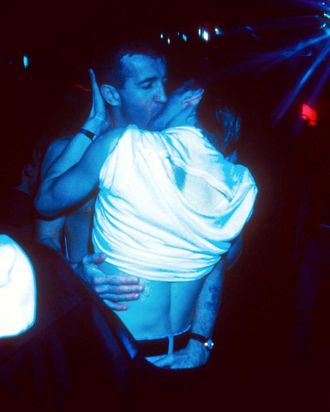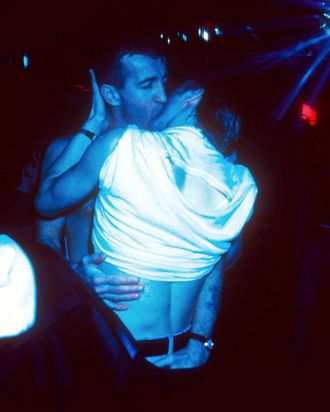
When I remember queer nights and gay bars now, there’s a filter on this category of memory that could be called “glisten.” The thought of even waiting in an interminable line just to go into a queer night club sounds like heaven to me now. But if I investigate an actual, concrete memory from inside the queer night, the flaws creep in from the edges. Looking back, the crowds could be icy or clingy, the only people I liked were my friends, and the atmosphere was sometimes too spiky for me to ever really relax in my own skin, which is often a central premise of queer nights to begin with. So even though I’d give anything to go back to a moody-mean-mediocre queer night now, I also know that when it was available, I often couldn’t wait to leave. I couldn’t wait for it to be better.
Gay Bar, the new cultural-history-memoir hybrid by American-born, London-based writer Jeremy Atherton Lin, is concerned exactly with this quality. The gay bar has a distinctive magnetic push-pull allure to its congregants, and the book contains an almost grueling level of ambivalence. “The gay bar has this cultural presence that’s sort of a joke,” says Atherton Lin over a video call. “It’s passé.” The book reminded me, again and again, even before the gay bars were closed, there was something about them that felt like they were already over. Gay Bar reinforces one of the most comforting positions about the gay bar I’ve ever encountered — that it’s disappointing.
Atherton Lin started writing Gay Bar in 2017, during the collective realization that half of the LGBTQ+ bars and clubs in London had shuttered within the past decade. To use a now-haunted phrase, little did we know, a few years later all the bars would be closed temporarily. And after months of holding on by a string, many more have closed permanently. So even though Gay Bar is written about a growing lacuna, this book feels like a report on the last glinting moments of gay bars.
The book recounts Atherton Lin’s personal hunt for queer spaces in London, Los Angeles, and San Francisco, many of which are long gone. “Gay bars have a furtive unknown history,” says Atherton Lin. “This history is already filled with these ambiguities and secrets and untold stories.” Lin, who is in his mid-40s, went to his first gay bar in Los Angeles about 20 years ago, though he can’t quite pinpoint exactly which was the very earliest introduction. The book follows him on a move to London, where his watchful eye observes a broad cultural shift: In 2005, Westminster City Council orders all gay bars in Soho to remove their gay flags. In South London a decade later, “standard pubs” hoisted rainbow flags casually. As Lin’s partner theorizes in the book: “Maybe the flags weren’t just inviting us in but keeping certain other types at bay. Maybe the flag, which once proclaimed what a bar is, now proclaims what it isn’t — a place for hooliganism, violence, machismo. We don’t want trouble here, the flag now signals. Cheaper than a bouncer.” Lin’s presence is a witness, his analysis almost prophetic.
This constant threat of foreclosure and erasure of the gay bar is what gives this book — an act of archiving and crystallizing memory, gossip, and research — its propulsive urgency. History and memoir converge: In the mid-’90s, at an opening night of an L.A. club called Cherry — which was “gay in a way that co-opted ’70s glam rockers who co-opted gay,” Atherton Lin writes—he runs into famed Warhol actress Holly Woodlawn. Atherton Lin is wearing gym shorts, huge yellow sunglasses and a shaggy coat borrowed from his best friend, “looking like Little Edie Beale forced to step out of the house.” Woodlawn gives him the once-over: “Honey, even I wouldn’t try getting away with THAT.”
Telling the history is liberating, but the bars might not have been. Atherton Lin shows that, as court rulings and social mores in America allowed the gay bar to become more legitimate and established, these places adopted repressive codes from the straight world. They often prioritized white gay men, rich gay men, gay men who presented their masculinity in a particular set of legible ways. In Atherton Lin’s first forays to gay bars in Los Angeles, he describes encountering a social set who “dismissed whole populations with one sting … To have a clear racial preference was a highly amusing character trait.” A lot of the book’s history recounts gay bars with brutal class dynamics, vicious racist policies. “I’m highly uncomfortable in a lot of spaces that are meant to be spaces for people like me,” he tells me over the phone.
If one has high standards for liberation, the gay bar’s failures are all the more embarrassing, its trappings all the more transparent, its symbols as troubled as they are triumphant. Certainly, there are sweeping outside forces — like the gentrification of queer culture — that have irreparably wounded the gay bar’s place in contemporary social life. But the gay bar enacts its own social code. Arguably, in its faults and blindspots, the gay bar has made itself passé.
When we’re able to go back, Gay Bar asks, will we want to? In the most recent pre-pandemic iteration of non-straight night life, a new breed of queer party had begun to emerge: roving nights with “incredible spirit” that often prioritize under-represented groups like trans femmes and queers of color. Atherton Lin characterizes the constantly shifting glimmer of these parties, writing: “To create inclusive spaces for these morphing identities is an ambitious undertaking, like planning a house for a vagabond.” These migrating parties tend to be the imaginative forefront of queer culture, and they aim to solve a problem of the gay bar (exclusivity). Atherton Lin wonders what’s lost when something is always on the move, what reliability is sacrificed by that shape-shifting. But certainly, a way of socializing that’s accustomed to constant adaptation might be best suited to create a party that emerges on just-steady ground. We’re just left asking now, what form will it take, when it meets us on the other side?

